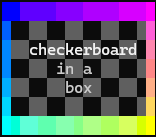node-styl-rgb v1.0.0
node-styl-rgb
simple bash console rgb syling. like node-styl for 256 and 16m color terminals.
Install :
npm install node-styl-rgbAdd colors and styles to your logs :
const { styl } = require('node-styl-rgb');
// or
import styl from 'node-styl-rgb';
...
console.log(""+styl('hello').front([80,255,0]).back([30,0,120]).underline);Use preformated style with the property theme :
...
const title = styl().front([80,255,0]).back([30,0,120]).underline.theme;
console.log("this is "+title(" A TITLE "));
console.log("this is "+title(" AN OTHER TITLE "));Clean rendered styles to handle text length :
...
const styled = "this is "+title(" A TITLE ");
const text = styl.none(styled);
console.log("styled=","'"+styled+"'",' length=',text.length);styl will detect automaticly if your terminal handles true colors. You can force rgb type by importing it instead of styl. available rgb displays are :
- types :
c256 : 256 colors.
require('node-styl-rgb').c256c16m : 16M colors.require('node-styl-rgb').c16m
available properties are :
theme : theme renderer
text : unstyled text content
styles : bold or b italic or i underline or u inverse blink strikethrough or s
front colors : white grey black blue cyan green magenta red * yellow
back colors : whiteBG greyBG blackBG blueBG cyanBG greenBG magentaBG redBG * yellowBG
available methods are :
- methods : front : sets standard or rgb front color back : sets standard or rgb back color style : sets styles string : Change contents * parse : parse contents characters
front : sets standard or rgb front color
/**
Sets front color
@param input standard (ex:'red') or custom characters rgb color value
(ex:'#f00' or '#ff0000' or [255,0,0] or 0xff0000)
or number (red channel 0-255) if v2 & v3 are numbers.
@param v2 green channel 0-255
@param v3 blue channel 0-255
@returns styl
*/
front(input: RgbInputType | null, v2?: number, v3?: number): Stylback : sets standard or rgb back color
/**
Sets background color
@param input standard (ex:'red') or custom background rgb color value
(ex:'#f00' or '#ff0000' or [255,0,0] or 0xff0000)
or number (red channel 0-255) if v2 & v3 are numbers.
@param v2 green channel 0-255
@param v3 blue channel 0-255
@returns styl
*/
back(input: RgbInputType | null, v2?: number, v3?: number): Stylstyle : sets styles
/**
sets styles
@param value can be a style name like "bold" or a list of styles like "bold,i,u" or ["bold","i","u"]
@returns
*/
style(value: string | string[]): Stylstring : Change contents
/**
Sets a new content
@param text
*/
string(text: string): Stylparse : parse contents characters
/**
Parses string characters keeping trac of relatve position
@param callback
@returns
*/
parse(callback: (v: ParseCallbackDataType) => void): stringExemples
Exemple 1
Base use exemple : simple title.
console.log("-".repeat(10) + "|" + styl("node-styl demo").green.bold + "|" + "-".repeat(10));Exemple 2
Recursive styling.
console.log(''
+ styl('test1 ' + styl('custom ').front('#08f')
+ styl('green ').back([100, 255, 50]).black
+ styl(' cyan ').cyan.italic.bold
+ styl('un' + styl('der').red + 'line').u).green + ' ');
Exemples with parse
Exemple 3
Use parse to make simple linear gradient.
console.log(
styl('gradient ' + styl('underlined').u + ' text')
.parse(obj => obj.styl
.back([255 * obj.colP, 0, 0])
.front([255, 255 * obj.colP, 255])
)
+ '');
Exemple 4
Use parse to make 2d linear gradient.
console.log(
styl("gradient displayed\non multiple\nrows with some\n2d variations").parse(obj => {
obj.styl.front([255 * (1 - obj.colP), 255 * obj.colP, 255 * obj.rowP]);
}) + ""
);
Exemple 4
Use parse to draw a box.
console.log("* box :");
console.log(
styl(
[
"+---------------+",
"| |",
"| " + styl(`checkerboard`).bold + " |",
"| in a |",
"| box |",
"| |",
"+---------------+",
].join("\n")
).parse(obj => {
if ("+-|".includes(obj.char)) {
obj.styl.back([255 * obj.colP, 255 * obj.rowP, 255 * (1 - obj.colP * obj.rowP)]).hidden;
} else if (Math.round(obj.col * 0.5 + obj.row) % 2) obj.styl.back("#444");
}) + ""
);